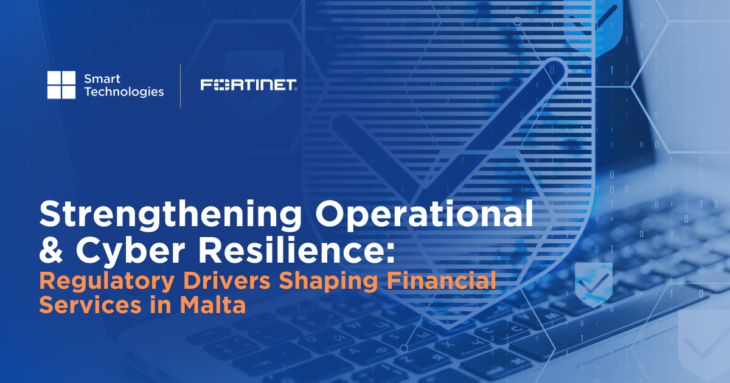
- April 10 2025
- Smart Technologies Ltd
Resilience can no longer be treated as a background concern. For financial institutions in Malta, maintaining operational continuity and strong cybersecurity has become essential, not just to meet regulatory obligations, but to protect customer trust and ensure long-term success.
At Smart Technologies, together with Fortinet, we are helping institutions build resilience that is both robust and scalable, delivering long-term value while meeting growing compliance demands.
What Is Operational Resilience, and Why Is It Critical?
Operational resilience refers to an organisation’s ability to continue delivering critical business services during disruptions—whether due to cyber incidents, technology failures, or wider systemic events.
In the financial sector, resilience is essential for maintaining trust, ensuring continuity of service, and protecting the broader financial system. As a result, regulators across Europe are tightening expectations to ensure institutions can identify vulnerabilities, respond to crises, and recover effectively.
Key Regulatory Developments Impacting Maltese Financial Services
While the UK continues to introduce its own resilience frameworks through the FCA and PRA, financial institutions in Malta, operating under EU jurisdiction, must focus primarily on the following:
DORA (Digital Operational Resilience Act)
DORA establishes a harmonised approach to ICT risk management across EU financial services. Key requirements include:
- Risk assessments for ICT-related threats
- Digital resilience testing and scenario analysis
- Monitoring of third-party service providers
- Timely reporting of major ICT incidents to authorities
DORA applies to a wide range of entities, including banks, insurers, investment firms, and critical ICT providers, making it particularly relevant for the Maltese market.
NIS2 Directive – Enhanced Cybersecurity Obligations
The NIS2 Directive strengthens the cybersecurity requirements for essential and important entities, including those in finance. Obligations include:
- 24-hour incident reporting
- Enhanced board-level accountability
- Implementation of cybersecurity risk management measures
GDPR – Ongoing Compliance and Data Integrity
As digital transformation accelerates, GDPR remains a foundational framework for data protection and privacy. Financial organisations must maintain robust data governance practices and ensure breach notification and consent processes are consistently upheld.
SEPA Instant Payments
The upcoming SEPA regulation mandates euro-denominated payments to be processed within 10 seconds. This requires infrastructure capable of real-time processing, high availability, and resilience under pressure.
Why Cyber Resilience Is Central to Regulatory Compliance
Cyber resilience is increasingly recognised as a fundamental aspect of operational resilience. Defined by the European Central Bank as the ability to “protect data and systems from cyberattacks, and to resume operations swiftly,” cyber resilience is essential in a sector where disruption risk is high and the threat landscape is constantly evolving.
Factors such as cloud adoption, reliance on third-party vendors, and emerging technologies like AI and IoT further compound the need for a resilient cybersecurity framework.
For Malta’s financial sector, this means ensuring readiness not only to prevent threats, but to detect, respond to, and recover from them in a timely and compliant manner.
Addressing the Challenges: A Strategic Approach
Some of the key challenges Maltese institutions face include:
- Managing hybrid infrastructures (cloud and on-premises)
- Meeting strict reporting timelines under NIS2 and DORA
- Navigating complex third-party risk management
- Allocating limited resources efficiently in a fast-changing environment
Adopting a structured, proactive approach to resilience, underpinned by the right technology, can help overcome these challenges while aligning with regulatory expectations.
How Smart Technologies and Fortinet Support Your Resilience Journey
Smart Technologies, as a Fortinet partner in Malta, delivers tailored solutions that help financial services institutions align with EU regulatory frameworks and strengthen both operational and cyber resilience.
Through Fortinet’s integrated platform, we provide:
- End-to-end visibility across networks and systems
- Advanced threat protection using AI-driven tools
- Automated incident response and recovery workflows
- Compliance reporting and risk assessments
- Continuous monitoring to ensure regulatory alignment
Together, we help organisations build a secure, agile infrastructure that supports long-term resilience and regulatory compliance.
Book a call today for a tailored consultation with our resilience and compliance specialists.